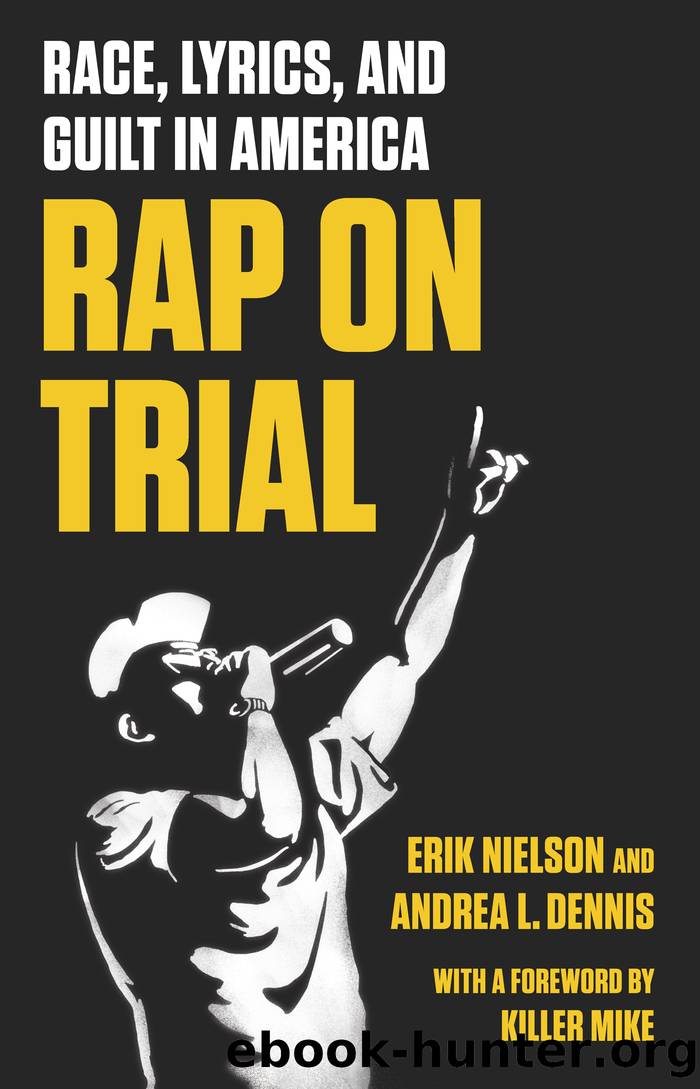Rap on Trial by Nielson Erik.;

Author:Nielson, Erik.;
Language: eng
Format: epub
Publisher: Lightning Source Inc. (Tier 3)
Published: 2019-07-14T16:00:00+00:00
4
What About the First Amendment?
On November 11, 2012, two Pittsburgh, Pennsylvania, police officers pulled over a vehicle driven by a young black man named Leon Ford Jr. for minor traffic violations. During the course of the stop, Ford produced a valid driver’s license, a valid vehicle registration, and valid proof of insurance, but police somehow became convinced that he was actually a man named Lamont Ford, a violent gang member. They called a police detective to the scene to help them sort out Ford’s identity.
When the detective arrived, the situation quickly escalated. Police directed a now terrified Ford to get out of the vehicle, but when he refused do so, citing his fear, the officers tried to forcibly pull him out of the vehicle. As this was happening, the detective claimed he saw a bulge in Ford’s pocket and, believing it was a gun, jumped into the car as it began to drive away. The detective shot Ford five times, causing the car to crash.
Ford was permanently paralyzed from the shooting. He didn’t have a gun. And he wasn’t the man police claimed he was. The city later settled with Ford for $5.5 million.1
Two of Ford’s friends, eighteen-year-old Jamal Knox and twenty-one-year-old Rashee Beasley, had their own troubles with Pittsburgh police and decided to speak up about it. Even before Ford was shot, Knox and Beasley, both aspiring rap artists, recorded a song called “Fuck the Police,” modeled after N.W.A’s iconic song with the same title. Knox and Beasley’s version was raw. It named two Pittsburgh police officers directly, both of whom had arrested Knox and Beasley months before Ford’s shooting (one of them, Michael Kosko, was involved in Ford’s shooting as well). It included lines like “Let’s kill these cops cuz they don’t do us no good/Pullin’ your Glock out cause I live in the hood/You dirty bitches.”
After Ford’s shooting became public, the video was uploaded to You-Tube by a friend of Knox and Beasley’s and then linked to Beasley’s Facebook account. But police had been secretly monitoring his Facebook account. They quickly spotted the video and charged Knox and Beasley with communicating a terroristic threat, a felony under Pennsylvania law. As is quite common in threats cases, the lawyers for Knox and Beasley raised a First Amendment defense, arguing that the song was protected speech. Their argument was rejected, and although the two young men denied that they intended to harm anyone, the trial judge found them guilty of making terroristic threats and sentenced them to prison.
It is widely known that the First Amendment provides constitutional protections for speech and applies to artistic and creative expression. It might be less known that First Amendment protections also generally extend to inflammatory and offensive language, which makes the First Amendment central to any discussion of rap on trial. But courts consistently fail to apply these First Amendment protections to rap lyrics in criminal trials. And even when the issue is front and center in a case, as it is when
Download
This site does not store any files on its server. We only index and link to content provided by other sites. Please contact the content providers to delete copyright contents if any and email us, we'll remove relevant links or contents immediately.
| General | Discrimination & Racism |
Nudge - Improving Decisions about Health, Wealth, and Happiness by Thaler Sunstein(7191)
iGen by Jean M. Twenge(5125)
The Fire Next Time by James Baldwin(4987)
Adulting by Kelly Williams Brown(4197)
The Hacking of the American Mind by Robert H. Lustig(4051)
The Sports Rules Book by Human Kinetics(4045)
The Ethical Slut by Janet W. Hardy(4008)
Captivate by Vanessa Van Edwards(3698)
Mummy Knew by Lisa James(3495)
In a Sunburned Country by Bill Bryson(3333)
The Worm at the Core by Sheldon Solomon(3293)
Ants Among Elephants by Sujatha Gidla(3260)
Suicide: A Study in Sociology by Emile Durkheim(2885)
The Slow Fix: Solve Problems, Work Smarter, and Live Better In a World Addicted to Speed by Carl Honore(2818)
The 48 laws of power by Robert Greene & Joost Elffers(2739)
Humans of New York by Brandon Stanton(2661)
Handbook of Forensic Sociology and Psychology by Stephen J. Morewitz & Mark L. Goldstein(2588)
The Happy Hooker by Xaviera Hollander(2561)
The Tipping Point by Malcolm Gladwell(2528)
